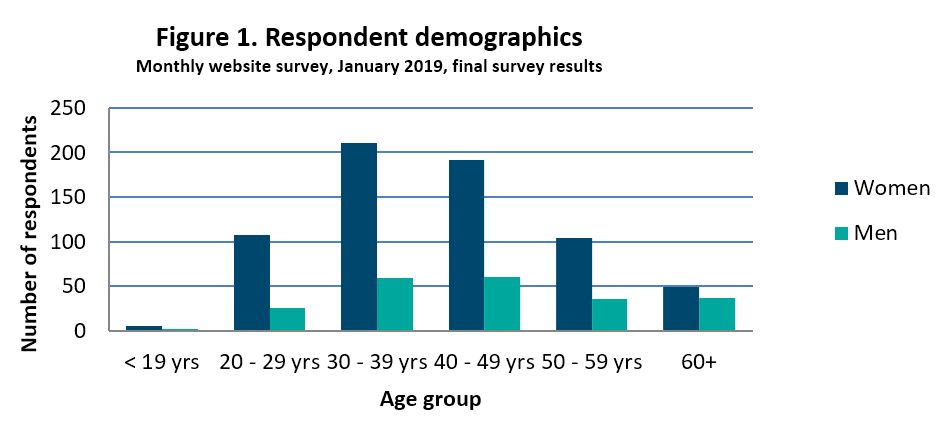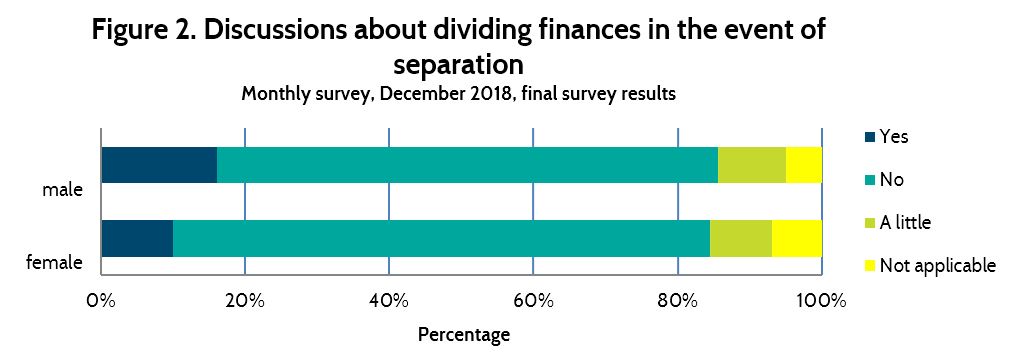Introduction
Would you like to be notified when a new survey report is released? Sign up here
Relationships Australia has previously explored how couples manage finances in their relationships in the August 2015 online monthly survey, and through Relationships Australia’s 2011 Relationship Indicator’s survey, a study which was conducted at regular intervals over a ten-year period to 2011 (Woolcott, 2011).
Prior studies identify financial stress and money worries as key issues for separating couples, noting there is a complex interplay between money and other known predictors of relationship stress such as gambling, mental health, family violence, and drug and alcohol use.
Relationships Australia’s January 2018 online survey sought to further understand how couples negotiate their finances by asking a few questions of visitors to our website during January 2019.
Previous research finds that…
- In an American study of more than 1,000 couples, forty-three percent (43%) of couples who had been married for more than 25 years started off in debt, while 86% of couples married for five years or less started off in debt, twice the number of their older counterparts (Cruze, 2018).
- Significant debt was found to be having a negative impact on marriages, regardless of household income. Forty-one percent (41%) of couples who had consumer debt report they argue about money more than any other issue (Cruze, 2018).
- An American Express survey found that only 43 percent of the general population talked about money before marriage, but the number rises to 57 per cent for affluent couples and 81 per cent for young professionals. Twelve per cent of the general population report they have never talked about money with their spouse (American Express Spending & Saving Tracker, June 2010)
Relationships Australia Results
More than 930 people responded to the Relationships Australia online survey in January 2019. Three-quarters (75%) of survey respondents identified as female, with more females than males responding in every age group (figure 1). Eighty-nine per cent of survey respondents were aged between 20‑59 years, and more than 55 per cent (57%) of respondents comprised women aged between 30-49 years (inclusive).
As for previous surveys, the demographic profile of survey respondents remains consistent with our experience of the groups of people that would be accessing the Relationships Australia website.

There were no significant differences in the reports of men and women when asked whether they had discussed their personal financial situation before they made a commitment to their current or most recent partner. More than one third of survey respondents (37%) reported they had discussed their personal financial situation, while just under one third (26%) had not discussed their personal financial situation prior to committing to their current or most recent partner. Similar reports were made about discussions of financial priorities.
For the majority of survey respondents, the state of their partner’s finances was not important (53%), or of little importance (20%), when they decided to enter into their current or most recent relationship. The state of their partner’s finances were an important consideration for a significant minority of women (16%) and men (8%) when they decided to enter into their current or most recent relationship.
Survey respondents were asked if they had discussed with their partner how their individual incomes would be shared. Men (36%) were more likely than women (31%) to report they had discussed how their individual incomes would be shared before they made a commitment to their current or most recent partner. Forty-three per cent of survey respondents had not discussed how their individual incomes would be shared before they made a commitment to their current or most recent partner.
Prior to making a commitment to their current of most recent partner, 56% of survey respondents reported they had not discussed how they would manage their couple finances if one of them no longer had an income. A further 14% had only discussed their couple finances ‘a little’.
A significant majority of women (74%) and men (69%) reported they had not discussed how they would divide their finances if their relationship ended prior to committing to their current or most recent partner (figure 2).

References
Cruze, R. (2018). Money, Marriage, And Communication: The Link Between Relationship Problems and Finances. Available at https://cdn.ramseysolutions.net/media/b2c/personalities/rachel/PR/MoneyMarriageAndCommunication.pdf
American Express Spending & Saving Tracker, June 2010 available at https://www.businessinsider.com/love-and-money-what-statistics-say-2012-2/?r=AU&IR=T
Woolcott Research. (2011). Issues and concerns for Australian relationships today, available at https://www.relationships.org.au/what-we-do/research/australian-relationships-indicators/relationships-indicator-2011
